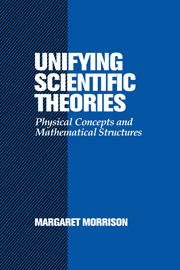Book contents
- Frontmatter
- Contents
- Acknowledgements
- Introduction
- 1 The Many Faces of Unity
- 2 Unification, Realism and Inference
- 3 Maxwell's Unification of Electromagnetism and Optics
- 4 Gauges, Symmetries and Forces: The Electroweak Unification
- 5 Special Relativity and the Unity of Physics
- 6 Darwin and Natural Selection: Unification versus Explanation
- 7 Structural Unity and the Biological Synthesis
- Conclusions
- Notes
- References
- Index
7 - Structural Unity and the Biological Synthesis
Published online by Cambridge University Press: 06 October 2009
- Frontmatter
- Contents
- Acknowledgements
- Introduction
- 1 The Many Faces of Unity
- 2 Unification, Realism and Inference
- 3 Maxwell's Unification of Electromagnetism and Optics
- 4 Gauges, Symmetries and Forces: The Electroweak Unification
- 5 Special Relativity and the Unity of Physics
- 6 Darwin and Natural Selection: Unification versus Explanation
- 7 Structural Unity and the Biological Synthesis
- Conclusions
- Notes
- References
- Index
Summary
Synthesis and Unity
In Chapter 6, I claimed that one of the problems with selectionist explanations was a lack of understanding of the mechanisms of heredity and variation. That difficulty was partially alleviated through the work of Gregor Mendel in the late nineteenth century, but with the rise of Mendelian genetics came a supposed conflict with Darwinian evolution. The debate was largely about the causal agents responsible for heredity and variation and about the nature of evolution itself. The controversy concerned the role of selection, as opposed to mutation, in producing changes in populations and whether evolution was gradual or discontinuous. Indeed, the issue of gradualism had a history that dated back to the publication of Darwin's Origin of Species.
Followers of Mendel saw the particulate nature of genetic factors as a basis for discontinuity in evolution and the hardness of inheritance (i.e., selection would have no effect on heritable traits). They argued that mutation pressures were the main agents of evolutionary change. Although selection was considered by Darwinians to be responsible for such change, some Darwinians claimed that individual variation was unimportant, that the causal factor in evolution was use or disuse, rather than selection. Consequently, the problems facing Darwinism included not just the origin of variation and the types of variations that were heritable but also the role of selection versus environmental conditions, which could give rise to use or disuse, the nature of species (whether they were real or abstract units) and the role of isolation in evolutionary change.
Information
- Type
- Chapter
- Information
- Unifying Scientific TheoriesPhysical Concepts and Mathematical Structures, pp. 210 - 231Publisher: Cambridge University PressPrint publication year: 2000
